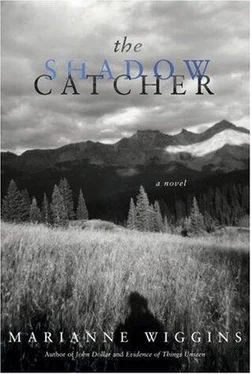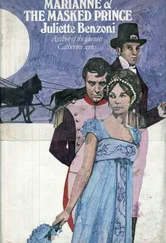In the middle of the north Midwestern winter, it had grown dark at four o’clock and Clara and Hercules had eaten the food Lodz’s housekeeper had packed. A conductor came around with blankets and straw pillows and fed the stove and took orders for their morning meal the next day at the depot in Bismark, Dakota Territory, where they would make a mandatory stop. Clara arranged a bed for Hercules across a row of seats and tucked the heated stone beneath the blanket by his feet. Do not leave this car, she’d whispered, patting him.
Promise. — Clara?
Yes?
This is an adventure.
Yes, it is.
They would have enjoyed themselves.
Yes, they would have.
She’d sat across the aisle from him, her head against the window and she’d stared into the black abyss that was the outside world. No lights. Steam, smoke and cinders were the only signs this night that man existed in these parts: and noise , the pounding of the engine felt in every bolt and join along the train’s snaking length. She took out the map they’d given with the tickets, figuring they must be somewhere now outside The States, somewhere coming on Dakota Territory, churning on toward Fargo, a non-place, nothing but a place the railroad made, named, like most of all these so-called cities out here — Billings, Livingston — after men who had done nothing in their lives to distinguish themselves but build a railroad. Was that heroic, in the ancient sense? Another Roman Empire , her father had remarked about the country’s nation-building: who the hell were Mssrs. Fargo, Billings, Livingston compared to Antony and Caesar? Had they any Cleopatras in their beds? Had they ever heard of Tragedy? All this land out here — bartered for its mineral rights, its copper and its coal and gold — had Greece been built this way? She knew next to nothing about commerce, about how fortunes were built and made — she knew almost nothing practical in life, in terms of practical, applicable skill . She knew how to sew a button. Knew how to tie a tourniquet. How to diagnose a fever. How to see a painting, see its harmony and see its flaws. But she couldn’t sell a stone to earn a penny. That was something that she needed to discover how to do. Turn a given fact of nature into money. Take something as God-given as the earth, or as her life, and turn it into something like the Louisiana Purchase, a self-generating profit. Dakota Territory, Montana Territory, Idaho Territory — all part of the Louisiana Purchase: all these so-called bounded states of being she’d be passing through: what sort of fictions were these places, except man-made fictions of the profit-driven kind? Were they works of art? Or sovereign nations? They were artificial designations bounded by dictums of greed, and she needed to learn to speak that language if she and Hercules were to survive. She needed to learn how to make a livelihood in order to escape from charity. In Seattle, she had heard, there was a University, even an opera house, but although she’d tried, before they’d left, to find a portrait of the city, a picture of its streets and civic centers, the only picture of Seattle that she’d found at the St. Paul Public Library had been of a sullen timber port, logs jamming in the foreground, tall ships crowding the shoreline of what appeared to be a backwater fishing village overshadowed by tremendous pines.
Seattle.
She’d repeated the syllables in her mind, see at tall , lingering on each sound, wondering what railroad tycoon had inspired the town’s name and what country he had come from with a name like that, Seattle, and then she realized that the rhythm of her thoughts was the rhythm of the train and that the troupe of nuns was singing in that rhythm, too. Well, not singing, actually, humming, harmonizing with their mouths closed, a fifth, a third, a seventh, Clara saw her mother’s fingers lifting off the keys to play those chords and the hallowed beauty of the music caught her by surprise, so unexpected. Other music flooded over her, memories of Chopin, Schumann and Amelia playing, always, her mother playing the piano, and the loss of that, the loss of all that beauty overwhelmed her, almost religiously. She’d plucked the embroidered handkerchief from her sleeve cuff and had dabbed her eyes, glancing across the aisle to see if Hercules was watching her. His blond head lay peaceful on the pillow, as his body rocked in rhythm to the rails. Sound asleep. Like any normal boy his age. Miraculously not weeping.
She must have slept, herself, sitting straight up, because what she’d remembered next was waking to the tinkling of soprano bells. Each nun had one, and as light rose behind the mountains outside the window, and the day had dawned, the nuns began to pray among themselves, each one ringing her own tiny bell for punctuation. The train had slowed.
The train had slowed and then the whole long thing had groaned to a shape-shifting halt, steam escaping like a demon soul from each extinguished part. Bismark. The Dakota Territory.
The nuns had gathered themselves up, birds lifting from a field, and Clara had not known what to do next, nor what was expected of her. She’d been acting on the fly for weeks, learning as she’d gone along, aware that she’d been learning, a first sign of being an adult. No one had informed her there would be a stop along the line where she’d be required to detrain. No one had forewarned her that their parents were going to die. Each casual happenstance since their deaths, therefore, put her on alert as portent for the worst. She had boarded at St. Paul in the belief that the railroad car she rode in was a closed set of circumstances, a closed paragraph, that the train tracks were a story line delivering her, premeditatively, from one point in her life into another. No one had told her there would be the odd depot, the unexpected staging place, along the line, requiring improvisation.
She followed the nuns into the aisle, down the iron steps to the platform, clutching Hercules with one hand and the other on the drawstring purse with eighty dollars inside, hidden in her bodice — and good thing, too: because what they encountered at the Bismark depot was a scene designed to part her from her money. There was a barbershop for men, a “hotel” for the ladies where they could rent a room for a few hours to have a bath and change their traveling clothes. There was a smoking room (again, for men), a restaurant, a saloon (for men), two waiting rooms (one for men and one for women), a dispensary, a chapel and — as the pièce de résistance —there were Indians.
Rising from a vastness too empty to comprehend, Bismarck depot appeared to her to be a masterpiece of cunning engineering. It was big . It offered one the illusion of a small but self-sustaining city. Landing at its threshold, being forced to grasp it in the forefront of the larger picture, pumped its size, inflated it and its importance, drew the disoriented passengers into its seductive promise of warm food, hot water and the blandishments of a known, cosmetically civilized and appealing world.
Clara had been too naïve to know how to order breakfast from the conductor the night before, so she and Hercules stood, immobile on the platform in the morning sun, while their fellow passengers filed past them with confidence into the beckoning maw of man-made comfort.
The depot, she reckoned — this artificial place — was meant to provide amenities the train, itself, was lacking. Passengers were required to detrain to be entertained and lulled into a sense of bought-and-paid-for engineered adventure. Time was displayed as it existed locally and elsewhere: there were clocks hanging on the depot walls heralding the current times in Chicago, San Francisco, New York, London, Paris and Oslo, as if to grant to each detraining soul a sense of kinship with a larger world when, in fact, they had been sidelined on the godforsaken tracks of a godforsaken nowhere. She was there with Hercules and she was responsible for him and she suddenly thought of their father traveling alone to Europe in his youth — to Paris and to Florence — imagined him detraining in a foreign landscape surrounded by the unfamiliar sights and sounds of latent possibilities. He would not have hesitated , she imagined. He would not have hoarded eighty dollars in a drawstring purse. “Let’s find ourselves some breakfast, Hercules,” she then and there resolved.
Читать дальше











